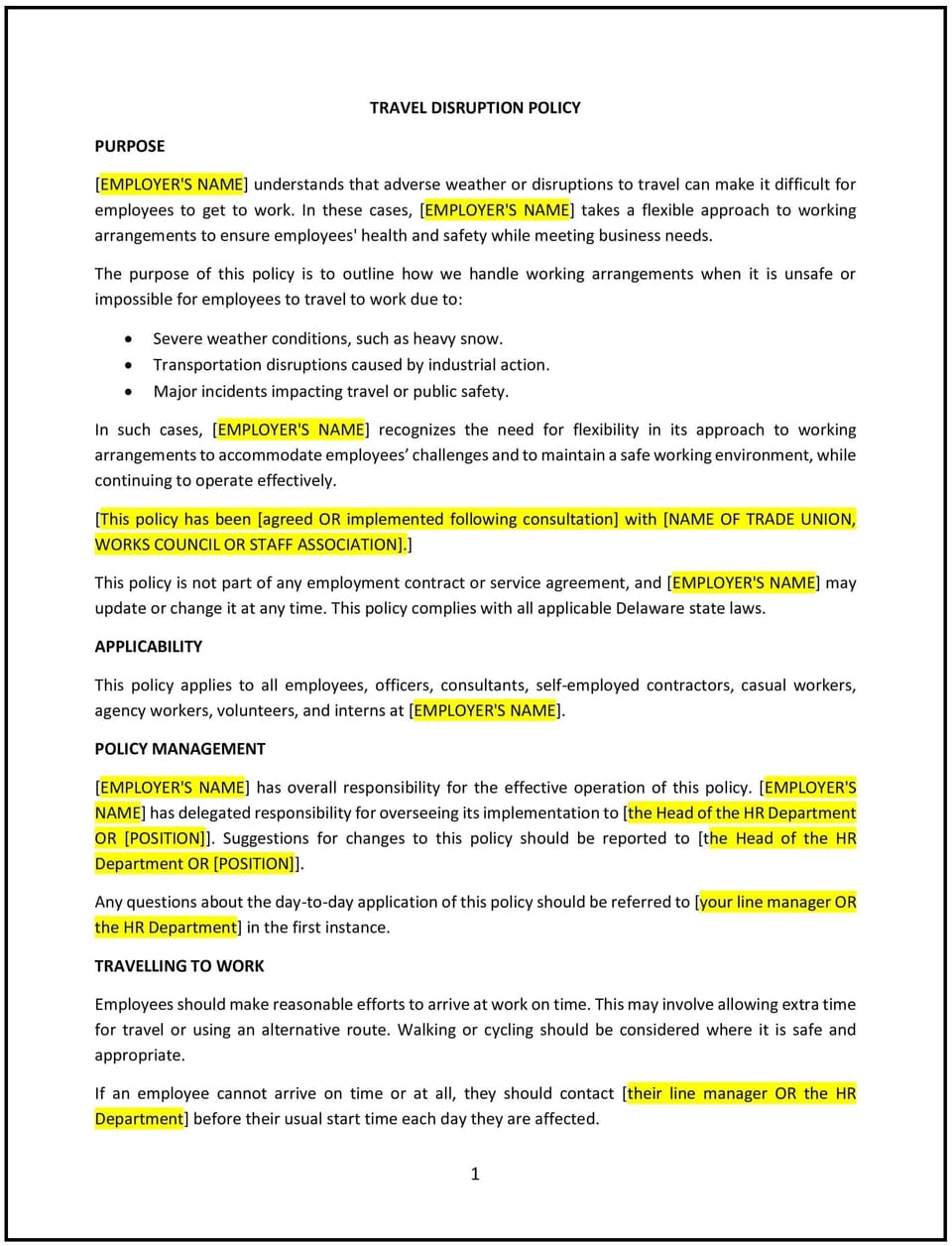Travel disruption policy (Delaware): Free template

Travel disruption policy (Delaware)
A travel disruption policy helps Delaware businesses establish procedures for handling unexpected travel interruptions, such as flight cancellations, weather-related delays, or other unforeseen circumstances. This policy ensures employees have clear guidelines for managing disruptions, seeking assistance, and recovering costs, minimizing stress and operational impact.
By implementing this policy, businesses can support employees during travel disruptions while maintaining financial accountability and operational efficiency.
How to use this travel disruption policy (Delaware)
- Define covered disruptions: Specify the types of travel interruptions included in the policy, such as delays, cancellations, missed connections, or natural disasters.
- Provide employee responsibilities: Outline steps employees should take during disruptions, such as contacting their manager, the travel provider, or company travel coordinator.
- Establish expense procedures: Clarify which additional expenses (e.g., meals, lodging, rebooking fees) are reimbursable and how to document them for reimbursement.
- Include emergency contacts: Provide employees with contact information for travel support, such as an internal coordinator or travel agency assistance.
- Ensure communication: Emphasize the importance of notifying managers promptly to coordinate alternative travel plans and minimize disruption to business operations.
- Monitor and review: Encourage employees to submit feedback about the handling of disruptions to refine the policy and procedures.
Benefits of using this travel disruption policy (Delaware)
This policy offers several benefits for Delaware businesses:
- Reduces employee stress: Provides clear steps for managing unexpected travel issues, ensuring employees feel supported.
- Promotes operational continuity: Minimizes the impact of travel disruptions on business activities by streamlining communication and rebooking processes.
- Ensures financial accountability: Establishes guidelines for reimbursing unexpected expenses while preventing unnecessary costs.
- Improves planning: Encourages proactive measures to address common travel risks, reducing future disruptions.
- Enhances employee trust: Demonstrates the company’s commitment to supporting employees during challenging travel situations.
Tips for using this travel disruption policy (Delaware)
- Communicate the policy clearly: Ensure employees are aware of the procedures for handling travel disruptions and the types of costs eligible for reimbursement.
- Provide pre-travel guidance: Encourage employees to review travel itineraries and identify backup options before their trip.
- Use a travel management system: Leverage tools to monitor travel arrangements, identify disruptions, and provide real-time support.
- Encourage documentation: Require employees to keep records of expenses and communications related to travel disruptions for accurate reporting and reimbursement.
- Update regularly: Review the policy to reflect changes in Delaware laws, company practices, or travel risks.
Q: Why is a travel disruption policy important for my business?
A: This policy ensures employees have clear guidance during travel interruptions, promotes operational continuity, and ensures financial accountability for unexpected expenses.
Q: What types of expenses are reimbursable under this policy?
A: Reimbursable expenses may include meals, lodging, transportation, or rebooking fees incurred due to disruptions, as outlined in the policy.
Q: How should employees handle travel disruptions?
A: Employees should notify their manager or travel coordinator immediately, document the disruption and associated costs, and follow the procedures for rebooking and reimbursement.
Q: Are there limits on expenses during disruptions?
A: The policy may specify caps or guidelines for additional expenses, such as daily limits for meals or maximum allowable lodging rates.
Q: How often should this policy be reviewed?
A: This policy should be reviewed annually or whenever Delaware laws, company travel practices, or external travel risks change to ensure continued effectiveness.
This article contains general legal information and does not contain legal advice. Cobrief is not a law firm or a substitute for an attorney or law firm. The law is complex and changes often. For legal advice, please ask a lawyer.


